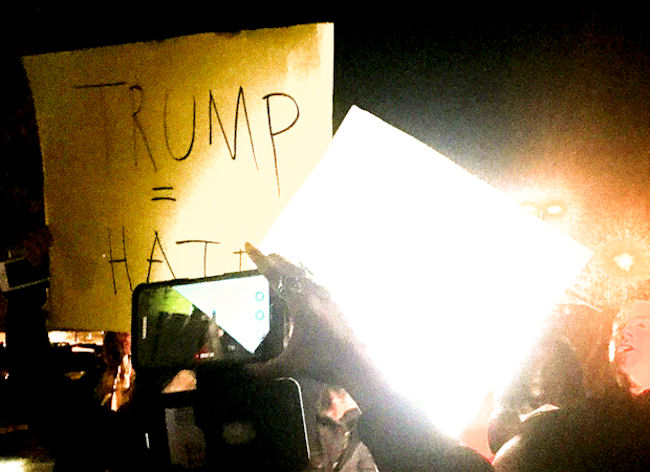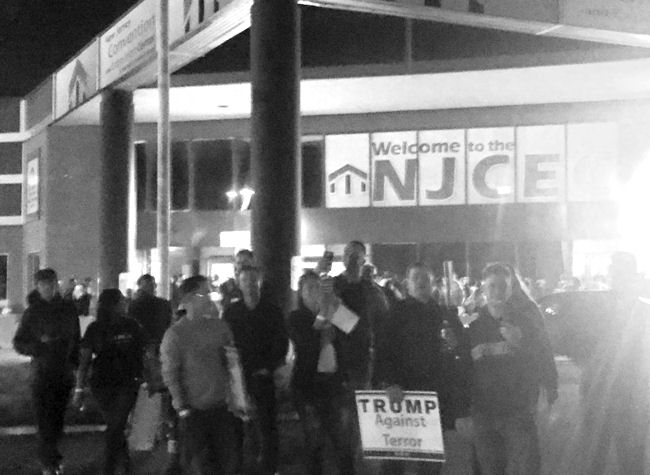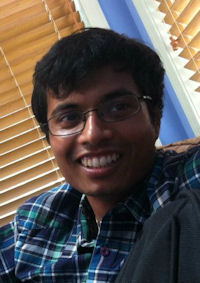
By Guest Contributor: Sudip Bhattacharya
“I need to pee, and I need a cookie,” I told my friend as we drove to Edison for an anti-Trump protest.
We stopped at a Dunkin Donuts where I used the bathroom and bought a chocolate muffin instead. I kept tapping my feet as we sat in the corner of the store. My heart was pounding against my chest.
When I first heard that the Republican Hindu Coalition was organizing an event for Donald Trump in Edison, New Jersey, I laughed. Another friend of mine – one who I’ve known since high-school — found out that the event was being held at the convention center, she quickly began organizing a protest. She’s quoted in this article at Quartz, where you can find more information about the background of what happened and why. She did the hard work of getting others involved, including me. Like I said, my immediate reaction was amusement and annoyance at the Trump event, rather than frustration or anger. But that mood changed as the week wore on. From watching interviews of Trump supporters online and hearing how gleeful they were about their misogyny and racism, flashes of prior incidences splashed across my mind, when protestors were pushed and assaulted. Plus, the election was nearing its peak, and it seemed like the true believers were prepared to do anything to win.

Once at the convention center on Saturday, my friend and I walked around the main entrance taking stock of the white faces in the crowd, many wearing their red hats and “patriotic” shirts. There were also security and police with bomb-sniffing dogs patrolling the area. Suddenly, I felt something I’d never experienced before at all the rallies and protests I’ve been in: fear. We were in a space dominated by certain reactionary interests. For the first time, I wasn’t part of a bigger group of people marching through the streets. Instead, I was just with my friends and a few others, all of us squaring off against a movement that had gained momentum and only sought to crush dissenters, a movement that viewed black and brown bodies as proof of treason. I managed to calm myself down, but the anxiety never completely went away. As night fell, when we were surrounded by Trump supporters yelling at us, my senses were heightened and my hands were numb. Necessary truths swirled in my head, as we tried to stick together and make sure none of them would attack us.
Lesson #1: Whiteness is a weapon.
Those of us who are of color and who live in suburban neighborhoods removed from constant police brutality and unequal economic deprivation can easily forget how deadly whiteness can be. Even though I’ve experienced racism, I believed that whiteness can be deflected or that I can find safety from it (i.e. spending more time in communities that are mostly South Asian American like myself). After already spending hours of chanting at passing cars on the main road, we joined the rest of the protesters by the main entrance where most of the Trump supporters were. Although there were only about a dozen of us, we held up our signs. For the majority of our time, we experienced confused faces from the South Asian American attendees, and some middle-fingers and yelling from the white ones. However, by night, a crowd of white Trump supporters poured out of the convention center. Immediately, we stepped back as they surrounded us and screamed at us until their faces turned red. It was a mob mentality as they descended upon our side of the street and began to harass us and call us names. At one point, we had no choice but to link arms and stay close to each other. It was clear that because of their whiteness, they were free to intimidate us and had the brashness to do so. Because of the color of their skin, they were emboldened to hate us without immediate repercussion. At one point, those of us who were protesting exchanged glances, and told one another that it’d be okay and to keep chanting. But we knew that anything could happen.
Lesson #2: Anti-black and anti-Muslim ideology is diffuse.
The U.S. is a country founded on anti-black feeling and belief. As a nation driven by white supremacist values (especially at its “founding), black Americans were made into the Other, and so marginalized. To gain racial currency and status, European immigrants bought into this system of discrimination and prejudice. Similar can be said of certain South Asian Americans who have chosen to believe in the worst stereotypes of black Americans while enjoying so-called acceptance by middle-class whites at work and in their neighborhoods. On Saturday, there were also countless Hindu South Asian Americans espousing the same level of prejudice against Muslims as any white American might express. It didn’t matter that many Muslims are part of the South Asian community. To the Hindus who support Trump, Muslims were the enemy. I wasn’t surprised at their comments about Muslims. I’ve experienced plenty of instances of South Asian Hindu men (most of whom are Brahmin) utter the most vile statements about Islam. However, what saddened me was the passion behind their words. Some were just as angry at us as the other white Trump supporters were, wagging their fingers at us and laughing.
Lesson #3: Oppression is “mutually reinforcing.”
Sexism, classism, racism, homophobia, Islamophobia. All these are connected and in different contexts, one can be more salient than the other or mixed with the rest. Whatever the case, none are completely untangled from one another. For example, when a Trump supporter claims that “immigrants are destroying the country”, he or she is also a believer in anti-black prejudice, sexism, and antagonism towards Muslims and anyone they see as “different.” As POC, we cannot expect a society based on social justice to emerge if we don’t dismantle all forms of oppression. This is rooted in critical feminist and race theory and a lot more of us should open our eyes as to how intersected our identities can be.
Lesson #4: This fight against prejudice isn’t just about old white people.
The most heartbreaking scenes that took place on Saturday were when we’d spot little girls holding up signs supporting Trump while their parents did the same. It was upsetting to realize how many of their parents’ racist and sexist beliefs will be passed down to them. Maybe they’ll grow up with friends who are woke, but chances are the neighborhoods they live in are places where most of their neighbors remain Trump supporters. Even those who were part of the mob who screamed at us could not have been that much older than we are.
Lesson #5: Ideas matter.
I’ll admit that there was a point during the night, especially when the Trump supporters confronted us, that I thought we’d be attacked. I expected someone to spit at us or punch us. The jokes that we were sharing just minutes before had vanished in the air that was suddenly thick with animosity. A lump had formed in my throat. My eyes darted at the random faces that threatened to engulf us. And yet, my friends continued to chant. “Don’t elect rape culture!” they yelled. “Trump is hate!” their voices swelled. It was obvious to me right then that we were the future. We were the ones with the big ideas, the ones who had hopes for a better country and world. Our ideas of social justice carried us. Eventually, the mob turned silent and bit by bit, and they dispersed. “Holy crap,” I said, “We won…” A friend turned to me and beamed.
To the person who is reading this, I understand your reasons for being skeptical. Especially if you’re of color, you’ve experienced your fair share of prejudice. You might sometimes feel as if what you do or say isn’t of concern to anyone. Most of us will face some sort of racial profiling. Many will be stopped by the police or chased and have our turbans ripped from our heads. So it’s perfectly understandable to want to keep a safe distance from events like the one on Saturday. But I’m confident that you also care deeply about the future of our country. Now, this is next part is meant for those of us who are South Asian American and who enjoy a certain amount of class privilege:
Staying on the sidelines is being complicit in the oppression of others. Don’t stand up against Islamophobia just because you’re Hindu and it might affect you next. Don’t stand up against anti-black ideology because one day, you think the white supremacists will come after you one day. Instead, show solidarity with all people of color because they are part of our community. All brown and black people deserve rights and respect. All POC deserve to be happy. If you enjoy certain economic privileges, such as those of us who have the time to read articles online about social justice, it is our responsibility to speak up. This is bigger than Trump. This is about challenging right-wing extremist forces. I am under no illusion that changing our society is going to be easy. As mentioned, being realistic is essential too. But I encourage you to stand shoulder-to-shoulder with your fellow POC. To let them know they’re not alone. To show them that they’re loved and understood.
That night, as we left, excitement filled us as we talked about how we beat back a crowd of angry Trump supporters by uniting as POC with our white allies. We began telling jokes again. I told everyone that I ate a chocolate muffin earlier in the day because I thought that would be the perfect fuel for a protest. We laughed.

Sudip Bhattacharya is a PhD student in Political Science at Rutgers University. He’s also a journalist and writer whose work has been published in CNN, Lancaster Newspaper, The Daily Gazette, The Jersey Journal, The Washington City Paper, The Aerogram, and AsAm news. He mostly focuses on issues of social justice, race, and identity through his work, and is a fervent optimist, but not the annoying kind.
Learn more about Reappropriate’s guest contributor program and submit your own writing here.
